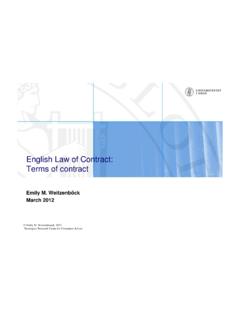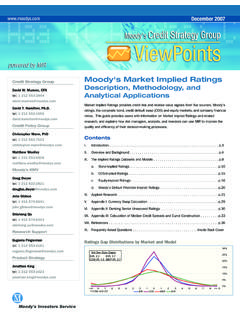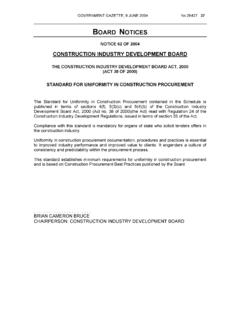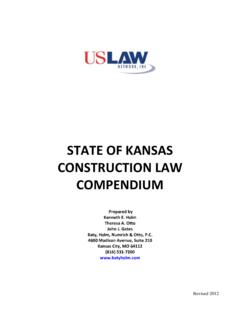Transcription of THE LAW OF INTERPRETING CONTRACTS - Orsinger
1 THE LAW OFINTERPRETING CONTRACTSR ichard R. Orsinger , McCurley, Nelson & Downing, Office:5950 Sherry Lane, Suite 800 Dallas, Texas 75225214-273-2400andSan Antonio Office:1616 Tower Life BuildingSan Antonio, Texas 78205210-225-5567 State Bar of TexasAdvanced Civil Appellate Practice CourseSeptember 6-7, 2007 Four Seasons Hotel, Austin, TexasCHAPTER 8 2007 Richard R. OrsingerAll Rights ReservedI. OVERVIEW.. -1-II. THE SCHOOLS OF -1-A. THE CLASSICAL -1-B. LEGAL REALISM.. -5-C. LAW AND -7-D. A DYNAMIC APPROACH TO -8-E.
2 THE IMPACT OF THEORY ON PRACTICE.. -8-III. IMPORTANT -8-A. THE GOAL OF -8-B. THE UNIFORM COMMERCIAL CODE ( UCC ).. -9-C. THE ORIGINAL AND SECOND RESTATEMENTS OF -9-D. INTERNATIONAL COMMERCIAL -10-E. STANDARD OF -12-F. THE FOUR CORNERS RULE.. -13-G. THE PLAIN MEANING RULE.. -14-H. INTERPRETATION VS. CONSTRUCTION.. -15-I. AGREEMENT VS. contract .. -15-J. INTEGRATED VS. PARTIALLY INTEGRATED VS. UNINTEGRATED.. -15-K. VAGUENESS VS. -16-L. AMBIGUITY.. -16-M. IMPLIED TERMS.. -16-N. FILLING IN THE GAPS.. -17-O.
3 RULES VS. -18-P. COURSE OF -18-Q. COURSE OF PERFORMANCE.. -19-R. USAGE OF TRADE.. -19-S. STATUTE OF -19-T. PAROL EVIDENCE RULE.. -19-U. MERGER CLAUSE.. -22-V. SUBSEQUENT ORAL -22-W. SCRIVENER S ERROR.. -22-X. DEFAULT TERMS PROVIDED BY LAW.. -22-Y. FORM CONTRACTS AND BOILERPLATE.. -23-Z. HIERARCHY OF CONSIDERATIONS.. -23-AA. SECONDARY RULES OF -24-1. Noscitur a Sociis (Take Words in Their Immediate Context).. -24-2. Ejusdem Generis.. -24-3. Expressio Unius est Exclusio -25-4. The Specific Prevails Over the -25-5.
4 The Earlier Prevails Over the Later.. -25-6. Handwritten Over Typed and Typed Over -25-7. Words Prevail Over Numbers or -25-8. Contra Proferentem.. -25-9. Presumption Favoring Arbitration.. -26-BB. THE PEERLESS CASE.. -26-IV. contract INTERPRETATION IN TEXAS.. -26-A. PRIMARY CONCERN.. -26-B. RULES OF CONSTRUCTION GENERALLY.. -27-C. WHEN CONSIDERING ONLY THE AGREEMENT ITSELF.. -27-1. Fully Integrated, Partially Integrated, and Unintegrated.. -27-2. Four Corners Rule.. -28-3. Multiple Contemporaneous Documents Construed as -28-4.
5 Clear Mistakes.. -28-5. Scrivener s Error.. -28-6. Plain Meaning Rule.. -29-7. Construe contract as a Whole.. -29-8. Noscitur a Sociis (Take Words in Their Immediate Context).. -30-9. Expressio Unius est Exclusio -30-10. Ejusden -30-11. Specific Terms Prevail Over General -30-12. Earlier Terms Prevail Over Later Terms (But not in Wills).. -30-13. Handwritten Over Typed and Typed Over -31-14. Words Prevail Over Numbers or -31-15. Notwithstanding Anything Else -31-16. Surrounding -31-17. Utilitarian -31-18.
6 Construction Must Be Reasonable.. -31-19. Use Rules of -32-20. -32-21. Contra Proferentem (Construe Against the Drafter).. -32-22. Things to -32-a. Don t Render Clauses Meaningless.. -32-b. Validity Preferred Over Invalidity.. -32-c. Presumption Against -32-d. Avoid Forfeitures.. -33-e. Avoid Implied Terms.. -33-23. Special -33-a. Arbitration Clauses.. -33-b. Deeds.. -33-c. Guarantees.. -33-d. Insurance Policies.. -33-D. WHEN CONSIDERING THINGS OUTSIDE THE -34-1. Statute of Frauds.. -34-2. Parol Evidence -34-3.
7 Surrounding -36-4. Course of Performance.. -36-5. Course of Dealing.. -36-6. Usages of Trade.. -36-E. AMBIGUITY.. -37-1. Definition of Ambiguity.. -37-2. Patent Vs. Latent Ambiguity.. -37-3. Question of Law Vs. Question of -37-4. What is Considered? .. -37-F. GAP-FILLING.. -38-V. SUMMARY -38-VI. THE ROLE OF THE JURY IN contract INTERPRETATION.. -39-VII. REVIEW ON APPEAL.. -42-VIII. -43-IX. FURTHER READING.. -43-X. THE PEERLESS CASE.. -45--1-The Law of INTERPRETING ContractsbyRichard R. OrsingerBoard Certified in Family Lawand Civil Appellate LawTexas Board of Legal SpecializationI.
8 OVERVIEW. Views on how courtsshould interpret CONTRACTS vary widely. At thesimplest level, the views have been contrastedas being either classical or modern, static ordynamic, textualist or contextualist, objectiveor subjective, literal or purposive, standard-ized or individualized, binary or multi-fac-eted. Scholarly writings about contract theoryreflect both detractors and defenders of classi-cal rules of contract interpretation, and presentseveral new schools of thought, but the writ-ings, taken as a whole, betray a lack of con-sensus on an underlying theory to justifyeither the old or the new approaches.
9 Thedoctrine of stare decisis favors continuation ofold methods, but some writers suggest thatcourts bend them occasionally, without sayingso, to achieve justice in individual cases. Andsome suggest that courts pick and choose fromthe available rules of construction in order toreach a desired situation is complicated by the fact thatdifferent sets of rules apply to different typesof CONTRACTS . Common law rules of interpreta-tion apply generally, but state legislatureshave adopted statutes, such as the UniformCommercial Code, which prescribe rules andstandards to be applied to certain kinds ofcontracts.
10 Other CONTRACTS are affected byconsumer protection laws, real property law,employment law, and securities law, to namea few. Alan Schwartz & Robert Scott, Con-tract Theory and the Limits of contract Law,113 Yale L. J. 541, 544 (2003) [ Schwartz &Scott ]. The government has enteredinto a treaty that some say preempts state lawsin international contract disputes involving thesale of goods. Plus, contracting parties some-times opt out of, or expressly invoke, variousstatutory or common law rules. So contractlaw is a article describes old and new approachesto INTERPRETING CONTRACTS , and then recounts therules of contract interpretation that are gener-ally recognized, citing to Texas cases thatspeak to those rules.





